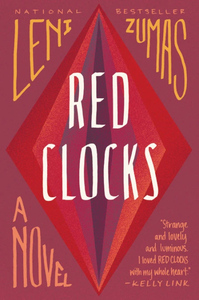Take a photo of a barcode or cover
challenging
dark
reflective
medium-paced
Plot or Character Driven:
A mix
Strong character development:
Complicated
Loveable characters:
Yes
Diverse cast of characters:
Yes
Flaws of characters a main focus:
Complicated
Moderate: Infertility, Abortion
Minor: Addiction
The science fiction-y part of this book is ever increasingly closer to home, as states mandate personhood in frightening ways. The more compelling aspect of the book for me was the central theme: why do we have children? Why do we want so much to copy ourselves/persist in the world/make more of us? It's something I've pondered; my kids are the worlds I gravitate around. They affected my life and my trajectory in ways I didn't expect and I wouldn't have it any other way, though my biggest worries and sadnesses are tied to their happiness, and that is smothering sometimes.
The author deftly tied all storylines together, though a huge coincidence was unlikely. I liked the setting; Oregon is just as depicted, a character of its own.
The author deftly tied all storylines together, though a huge coincidence was unlikely. I liked the setting; Oregon is just as depicted, a character of its own.
There are pieces of this book that I really liked. There are certainly more pieces that I liked than I disliked. I like the premise and the dystopian Personhood Amendment theme. I really liked the writing style and some quotes are really pretty. I don't get why The Wife was included other than to serve as a totem for envy for one of the other women especially because her role with The Mender is minuscule. I don't like the additions of The Biographers book, confusing and not necessary. In fact, remove this entirely which creates more room for background on how we got to this state within the book and I think the better would be better for me. I am really stumped about inclusion of The Biographers book biography other than to show "look this is why she is a biographer." Anyone???? Am I missing something????
Abortion is illegal in the United States. In-vitro fertilization is banned. A new law called Every Child Needs Two is passed. Personhood Amendment grants rights of life, liberty, and property to every embryo. This new reality further alienates high school teacher, Ro, from her goal of having a child as a single mother with artificial insemination. She is older and the odds are not good. To add to her stress, she is writing a biography of a female polar explorer and a female student becomes accidentally pregnant. They both come into contact with Gin, the Mender who lives in the forest and eventually connects all the characters in the book. This dystopian novel is not a far cry from current headlines. For readers who liked, “The Handmaid’s Tale”, and “The Power”. I am excited for what Leni Zumas might write next. -Lisanne E.
Bookshop Santa Cruz Winter Reading Program 2018/19.
I’m not really into feminist writing and probably would never have read this except for the reading program and the fact that I already had the book (I often feel obliged to at least start a book that’s been given to me).
Zumas surprised me with her ability to intertwine women’s themes into the story while not making the story seem like a manifesto. Not all the women won but not all of them lost. Not all the women ended up in a better place but most had more hope.
I’m not really into feminist writing and probably would never have read this except for the reading program and the fact that I already had the book (I often feel obliged to at least start a book that’s been given to me).
Zumas surprised me with her ability to intertwine women’s themes into the story while not making the story seem like a manifesto. Not all the women won but not all of them lost. Not all the women ended up in a better place but most had more hope.
Written in 2018 but wildly relevant today, this story told from multiple perspectives is thought provoking, human, and overall a darn good story.
Simple, powerful, deeply unsettling — and I love the honesty with which it deals with the hostilities between its female characters. Womanhood is not a monolith, but women's lives are affected and harmed by limited access to abortion in myriad ways.
Imagine that the U.S. outlawed abortions and adoptions by anybody but married heterosexual couples. Leni Zumas helped me imagine it by relating the stories of several people in one community after those laws are passed. We hear first-person accounts from a pregnant teenager, a single woman who desperately wants to be a mom, a married mom who isn't all that well suited to motherhood, a holistic women's care provider. Harrowing.
“She did not leave behind money or property or a book or a child, but her corpse kept alive creatures who, in turn, kept other creatures alive.”
“Whatever frees Gin Percival to leave her hair twiggy and wear shapeless sack dresses and smell unwashed - the wife wants that.”
“Whatever frees Gin Percival to leave her hair twiggy and wear shapeless sack dresses and smell unwashed - the wife wants that.”
There are definitely some inevitable comparisons to Handmaid's Tale, because it imagines a world where women are stripped of their bodily autonomy. This is a subtler approach, though, and the tone and style are entirely different. The women in this book are trapped within structures and rules that, mostly, already exist. Most are just carried out to a logical conclusion.
This is a character-driven story. Things happen, but the women's internal lives are the compelling part. Everyone has good reason for their choices and what they choose to withhold. I was most drawn to Ro's story, and I loved her for the choices she makes, and all the more because of how hard she struggles with those choices. She has perfectly good reasons to go in another direction, and I wouldn't have blamed her. I'm so glad my intuition was wrong about where her story was headed.
Not that the other characters were weak. Each perspective shift comes with as much reluctance to leave the last character as excitement to pick up the new character's thread.
I love books like these, that have me thinking about the characters long after I've put it down.
This is a character-driven story. Things happen, but the women's internal lives are the compelling part. Everyone has good reason for their choices and what they choose to withhold. I was most drawn to Ro's story, and I loved her for the choices she makes, and all the more because of how hard she struggles with those choices. She has perfectly good reasons to go in another direction, and I wouldn't have blamed her. I'm so glad my intuition was wrong about where her story was headed.
Not that the other characters were weak. Each perspective shift comes with as much reluctance to leave the last character as excitement to pick up the new character's thread.
I love books like these, that have me thinking about the characters long after I've put it down.


